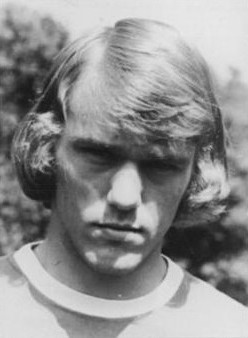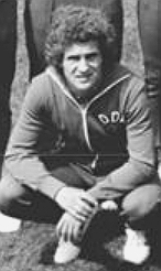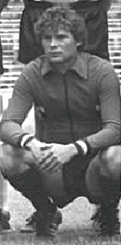
Bernd Bransch was a footballer from East Germany who played as a sweeper.

Jürgen Croy is a German former professional footballer who played as a goalkeeper. He made 86 appearances for the East Germany national team.

Jürgen Sparwasser is a retired German football player and later briefly a football manager.

Jürgen Pommerenke is a German former professional footballer who played as a midfielder.

Konrad Weise is a German former footballer who played as a defender. He played his career at senior level for Carl Zeiss Jena (1970–1986). At international level he played between 1970 and 1981 for the East Germany national team, and was a participant at the 1974 FIFA World Cup.

Rüdiger Schnuphase is a German former football player.

Wolfgang Blochwitz was a football goalkeeper from East Germany.

Roland Ducke was a German professional football player. His younger brother Peter was also a successful footballer.
The 1962–63 DDR-Oberliga was the 14th season of the DDR-Oberliga, the first tier of league football in East Germany.
The 1969–70 DDR-Oberliga was the 21st season of the DDR-Oberliga, the first tier of league football in East Germany.

Manfred Zapf is a German former footballer, later a coach. A defender, Zapf spent his entire senior career with 1. FC Magdeburg, and captained the club to its greatest successes – three DDR championships, four cups, and the Cup Winners' Cup of 1974. In his time with the club he appeared in 327 league matches in the DDR-Oberliga and played 30 matches in the second-tier DDR-Liga.

Wolfgang "Maxe" Steinbach is a German former football player and manager who spent most of his career playing for 1. FC Magdeburg in the DDR-Oberliga. At international level, he made 28 appearances for the East Germany national team scoring one goal. In 2006, he was elected Best 1. FC Magdeburg Player of All Times in a telephone vote.
Axel Wittke is a German former footballer who played as a right midfielder in the DDR-Oberliga and the 2. Bundesliga. In 1983, he won the FDGB-Pokal, the East German cup with 1. FC Magdeburg. He played for his country at youth level and was part of the Olympic Games squad that failed to qualify for the 1988 Summer Olympics.
Joachim Walter was a German footballer who played as a forward for SC Aufbau Magdeburg, later renamed 1. FC Magdeburg in the DDR-Oberliga, the East German top flight. He won the East German cup competition FDGB-Pokal three times and played for his country four times at junior level.

Andreas Bielau is a German former footballer who played as a forward.

Frank Siersleben is a German former football player and manager. He spent the majority of his career with 1. FC Magdeburg playing in the DDR-Oberliga, East Germany's top flight, and won 23 caps for East Germany youth national teams.
Henry Lesser is a former German footballer.

Andreas Krause is a German former footballer.

Lutz Lindemann is a German professional football coach and former player. In the top division of East German football, the DDR-Oberliga, he played for FC Rot-Weiß Erfurt and FC Carl Zeiss Jena. After his football career, the former GDR international was, among other things, a coach at FC Erzgebirge Aue and club president at FC Carl Zeiss Jena.

Claus Boden was a goalkeeper in the Oberliga, East Germany's top division. He played there for Dynamo Dresden and Stahl Riesa. Boden appeared 16 times for the East German under-23 national team.















